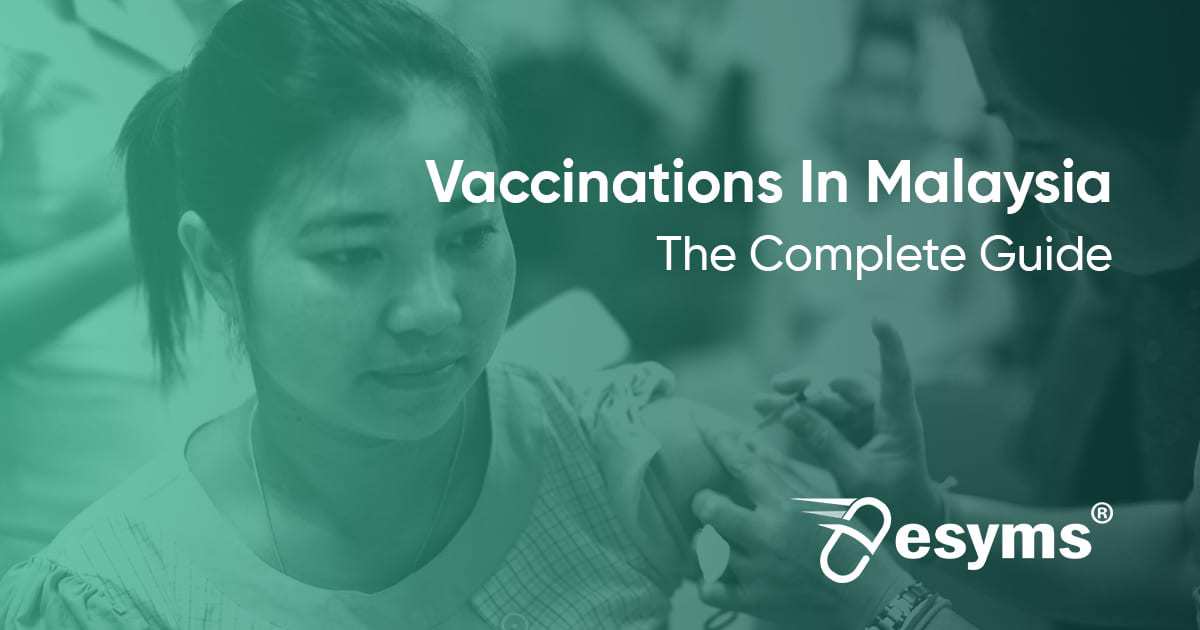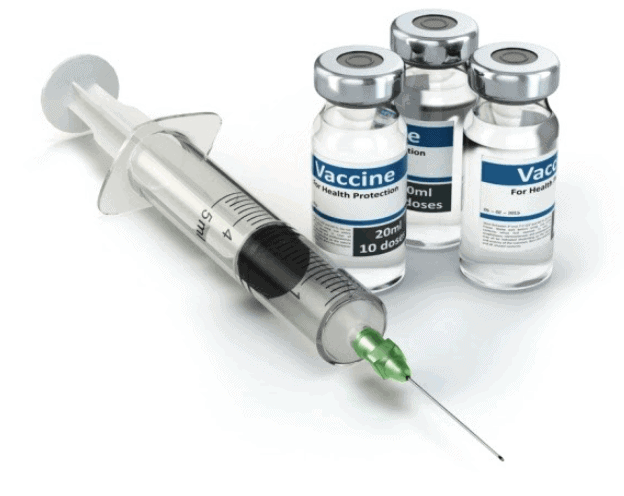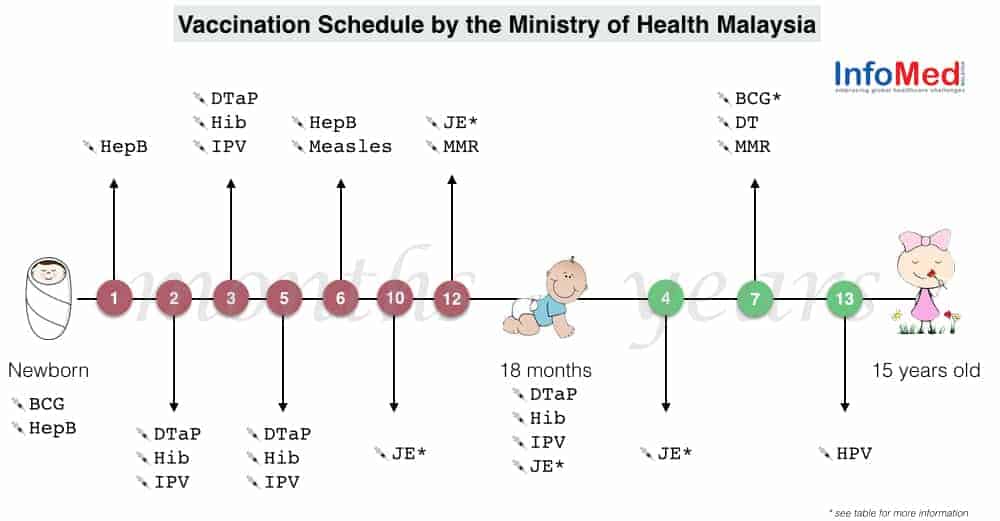The Complete Guide To Vaccination In Malaysia (2020)

- Esyms Team
- July 30, 2020
- 9:07 am
SHARE THIS ARTICLE
BROWSE OUR GUIDE
Overview
Over the years, there have been countless debates on whether we should be vaccinated.
The short answer is yes.
Vaccination is no doubt one of modern medicine’s greatest achievements, contributing enormously to global health. Unfortunately, due to non-scientific misinformation, rumours and political scare tactics, these have created windows for preventable diseases to make a dangerous comeback.
The topic of vaccination has also been in rampant discussion ever since the COVID-19 broke out earlier this year. So, let us explore what vaccines actually are and should you vaccinate?
What are vaccines?

Vaccines are products that immunize your body against dangerous and deadly diseases. Unlike medicines, vaccines prevent diseases rather than treat or cure them.
Vaccines contain formulated harmless or inactive viruses or bacteria that help the body develop immunity by imitating an infection, without the risk of getting the disease. It triggers and builds the body’s natural immune response as it would to a real infection to provide long-term protection against the disease in future.
Therefore, not to be mistaken as contracting disease, it is expected and normal that sometimes the imitation infection can cause minor symptoms such as fever. It is only through this that your body can safely build immunity.
What are the common vaccines in Malaysia?
In Malaysia, we have a vaccination schedule known as the National Immunisation Programme (NIP). Here are a few types of vaccines available under this programme and the diseases which they prevent:

1) BCG
Known as Bacillus Calmette–Guérin (BCG), this vaccine was introduced in 1961 and has been included in the schedule ever since. This particular strain of bacteria causes tuberculosis (TB) in cattles but is altered so it does not cause the disease in humans. Instead, like all vaccines, it stimulates our bodies to produce immunity towards TB. This doesn’t mean that a child vaccinated with BCG will be completely immune towards the disease, but rather in the event that a vaccinated child contracts TB from an adult, the vaccine prevents the disease from getting serious or limit the spread.
2) MMR
MMR simply stands for Measles, Mumps and Rubella. These are the 3 main diseases which this vaccine prevents. It is usually given to babies at ages 1 and a booster shot given at age 6/7. There is a misconception that as we progress to better lifestyles and hygiene, we do not need to worry about these diseases. This is a false assumption as these are transmitted through the air via coughs and sneezes. In as recent as 2019, we saw a measles outbreak in Kelantan which resulted in as many as 15 deaths. These are deaths completely preventable by vaccination.
3) Polio
IPV, or inactivated Polio vaccine, is an injection into the muscle in combination with a few other vaccines. It provides protection against polio, a distressing disease which targets the spinal cord and can lead to paralysis of the body. This diseases was thought to be eradicated as the last case before 2019 was back in 1992. Until March 2020, there are a total od 4 confirmed cases. Polio is a disease which mainly affects children below 5 years old and is given to babies at 2 months of birth in the NIP.
Why are vaccines important?
Thanks to vaccine programs throughout the world, our population has led improved overall health by reduced transmission of diseases, permanent and temporary disabilities and infant mortality. Vaccine programs also help to build a phenomenon called Herd Immunity.
Herd Immunity occurs when a large population of a community has been vaccinated and is immunized against contagious diseases, reducing the chance of an outbreak. People who cannot receive vaccines such as certain infants, pregnant women and immunocompromised patients depend on this type of protection.
However, if vaccination rates fall below this threshold, herd immunity method will be ineffective thus putting everybody at risk.
Debunking Vaccination Myths
Even though vaccines have been scientifically proven to be safe and effective, there are still many myths at large, keeping vaccines at the center of controversy. With intention to emphasise the safety and necessity of this important healthcare custom, here are the few vaccine myths to address.
Myth #1: Natural immunity is better than Vaccine-acquired immunity
Natural infection from certain diseases can kill or seriously harm the body before it is able to develop its own strong immune system. Vaccines helps to immunize the body without contracting the disease.
Myth #2: Vaccines can cause Autism
No scientific evidence was ever found to support Dr Wakefield’s 1998 research that MMR vaccine causes autism, and in 2004 researchers have discredited Dr. Wakefield’s work after he was exposed for being paid by Richard Burr to fabricate this claim, due to his lawsuits with makers of MMR vaccine.
Myth #3: Vaccines are just for children
Adults can and should get vaccinated. Even though it is common that we receive most of our vaccinations during childhood and adolescence, adults could also be at risk of certain diseases due to their ages, jobs, lifestyles, travel, and other health conditions.
Myth #4: Vaccine-preventable diseases don’t occur anymore
Take your own preventive steps to protect yourself and community. Do not solely rely on “herd immunity” thinking you won’t be affected because, if enough unvaccinated individuals only rely on herd immunity as the method of prevention, this could lead to massive yet preventable outbreaks.
Myth #5: A baby’s immune system cannot handle so many vaccines
In reality, a baby’s immune system deals with thousands of antigens daily. Therefore, a baby’s immune system is stronger than you might think. Scientists believe even if all 10 recommended vaccines were given to a baby at once, it would only use up about 0.1% of the immune system.
Adult Vaccines In Malaysia
For adults, there are many diseases, including some cancers, that are preventable by vaccines. Here are some examples:
1) HPV
Folate helps create new healthy red blood cells. Folic acid, it’s synthetic form are usually taken during pregnancy as a supplement. Folate-rich foods include legumes, asparagus, eggs, leafy greens, broccoli, nuts and seeds.
2) Influenza (Flu shot)
Minerals are elements in food that our bodies needs to develop and function normally. The minerals essential for health include: calcium, phosphorus, potassium, sodium, chloride, magnesium, iron, zinc, iodine, chromium, copper, fluoride, molybdenum, manganese, and selenium.
3) Hepatitis A
Lets look at what are some of the common minerals in the body used for.
Calcium is found in food like milk. When consumed, it is stored in teeth and bones to make them healthy and strong. Potassium, sodium, and chloride are electrolytes in your body fluids which are required for your body to produce energy and move your body. Magnesium helps your body regulate muscle and nerve function, blood sugar levels, and blood pressure. Iron is required for the production of red blood cells. Zinc is required for your body’s immune system and plays a role in cell healing and growth.
What about vaccines for COVID-19?
Finally, we address the elephant in the room, which in this case is an elephant so small we it’s invisible to the human eye. The COVID-19 is a form of flu virus, more specifically the coronavirus. So why don’t we have a vaccine for this deadly disease?
As with all newly discovered diseases, potential medications and vaccines have to go through a rigorous process in order for it to be marketable and usable by the general public.
According to Dr. Robert Amler, dean of the School of Health Sciences and Practice at New York Medical College, a vaccine typically takes longer to develop than a treatment. There are over 100 projects around the world in search of a vaccine. Some postulate that it can be as early as January 2021 while some others estimate at a much later date.
One thing is for sure: we are NOT out in the clear yet. So, we should all still adhere to the standard operating procedures and maintain proper hand hygiene.
Reference Links
- https://futurism.com/images/vaccine-myths-2
- https://www.healthymepa.com/2016/08/11/5-vaccination-myths/
- https://www.aaaai.org/conditions-and-treatments/library/allergy-library/vaccine-myth-fact
- https://www.publichealth.org/public-awareness/understanding-vaccines/vaccine-myths-debunked/
- https://www.rush.edu/health-wellness/discover-health/7-myths-about-vaccines
- https://www.cdc.gov/vaccines/parents/vaccine-decision/index.html
- https://www.mayoclinic.org/healthy-lifestyle/infant-and-toddler-health/in-depth/vaccines/art-20048334
- https://www.medicalnewstoday.com/articles/323254.php
- http://www.myhealth.gov.my/en/bcg-tb/
- http://www.myhealth.gov.my/en/mmr-mumps-measles-a-rubella/
- http://www.myhealth.gov.my/en/hpv-human-papillomavirus-vaccination/
- https://healthmetrics.co/m/guide-for-hrs-influenza-flu-vaccine-for-malaysian-companies/
- https://www.healthline.com/health-news/heres-exactly-where-were-at-with-vaccines-and-treatments-for-covid-19#Vaccines
